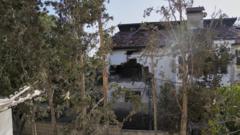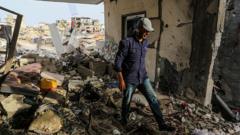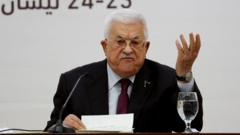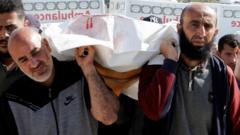In a significant turn of events, Israel's military has publicly acknowledged that its forces mistakenly targeted a United Nations guesthouse in Gaza, resulting in the death of a Bulgarian aid worker and injuries to six others. This incident has raised alarms about the safety of humanitarian operations in a region under severe humanitarian strain.
Israel's Acknowledgment of Fatal Strike on U.N. Aid Workers in Gaza

Israel's Acknowledgment of Fatal Strike on U.N. Aid Workers in Gaza
In a rare admission, Israel takes responsibility for a deadly attack on a U.N. facility, sparking international concern.
Israel's military admitted on Thursday to the attack, which occurred on March 19 in Deir al Balah, marking the second instance in a week where Israel has recognized wrongful fire directed at aid workers. This acknowledgment raises questions about the operational protocol of the Israel Defense Forces (I.D.F.) in conflict areas where non-combatants are at risk.
Initially, Israel rejected any responsibility for the incident and maintained that the I.D.F. had no connection to the attack, instead suggesting that Hamas was utilizing U.N. facilities for concealment. However, following an internal review, an official statement was released expressing regret for the loss of life and announcing ongoing assessments to prevent future incidents, showcasing a rare moment of accountability amidst persistent conflict.
The aftermath of this strike has compelled U.N. Secretary-General António Guterres to withdraw a third of international staff from Gaza, due to intensified safety concerns for their personnel. This reduction in humanitarian aid capabilities comes at a crucial time, with approximately two million Palestinians already facing dire conditions in the enclave.
As the situation evolves, the implications of this attack extend beyond immediate casualties, potentially affecting international relations and the operational strategies of humanitarian organizations working in conflict-ridden zones.
Initially, Israel rejected any responsibility for the incident and maintained that the I.D.F. had no connection to the attack, instead suggesting that Hamas was utilizing U.N. facilities for concealment. However, following an internal review, an official statement was released expressing regret for the loss of life and announcing ongoing assessments to prevent future incidents, showcasing a rare moment of accountability amidst persistent conflict.
The aftermath of this strike has compelled U.N. Secretary-General António Guterres to withdraw a third of international staff from Gaza, due to intensified safety concerns for their personnel. This reduction in humanitarian aid capabilities comes at a crucial time, with approximately two million Palestinians already facing dire conditions in the enclave.
As the situation evolves, the implications of this attack extend beyond immediate casualties, potentially affecting international relations and the operational strategies of humanitarian organizations working in conflict-ridden zones.

















